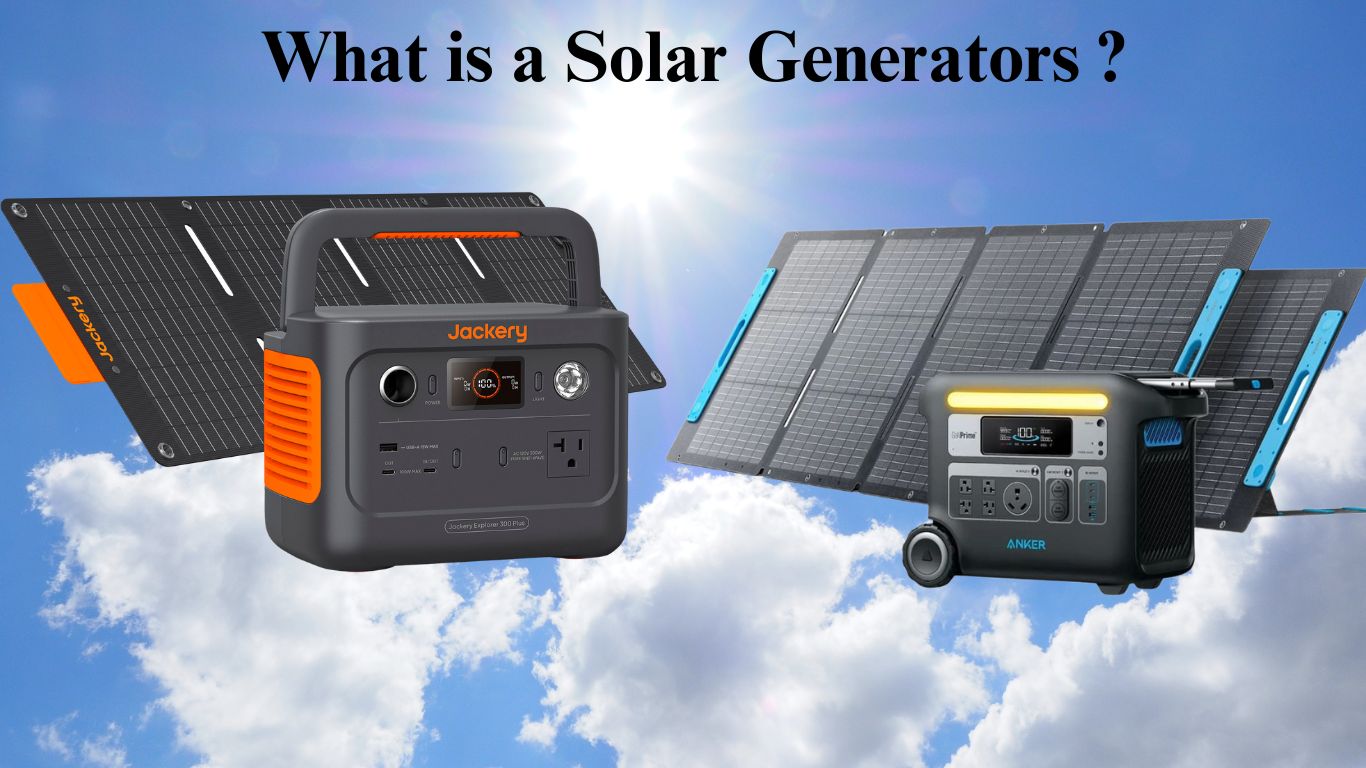What is a solar generator? At its core, a solar generator is a revolutionary device that transforms sunlight into electrical energy, offering a cleaner, greener alternative to traditional power sources. As our planet faces escalating environmental challenges, the adoption of solar generators marks a significant step towards sustainability. These devices not only reduce our reliance on fossil fuels but also minimize carbon footprints, promoting a healthier environment. Embracing solar generators means investing in a future where energy is abundant, renewable, and eco-friendly, underscoring the pivotal role they play in our journey toward environmental stewardship.
What is a Solar Generator?
A solar generator is a sophisticated device that harnesses sunlight, converting it into electrical energy. This process is facilitated through several core components: solar panels, a battery, a charge controller, and an inverter. Each part plays a pivotal role in ensuring efficient energy conversion and usage.
Core Components Explained:

- Solar Panels: These are the frontline soldiers in the battle for energy efficiency. Solar panels absorb sunlight and convert it into direct current (DC) electricity.
- Battery: The battery acts as the storage unit for the electricity generated by the solar panels. It ensures that power is available even when the sun isn’t shining.
- Charge Controller: This component regulates the flow of electricity to and from the battery, protecting it from overcharging and helping to prolong its life.
- Inverter: The inverter takes the DC electricity stored in the battery and converts it into alternating current (AC), the type of electricity commonly used in homes and businesses.
How Does a Solar Generator Work?:
When sunlight hits the solar panels, they generate DC electricity. This electricity flows to the charge controller, which manages the energy flow to the battery. The battery stores this energy until it is needed. When you need to power an appliance, the stored DC electricity is sent to the inverter, which converts it to AC electricity, making it usable for most devices.
Advantages and Limitations of Solar Generator:
Advantages:
- Renewable Energy Source: Solar generators use sunlight, a free and abundant resource.
- Portability: Many solar generators are compact and easy to transport, making them ideal for camping, emergencies, or off-grid living.
- Quiet Operation: Unlike traditional gas generators, solar generators operate silently, contributing to a peaceful environment.
- Low Maintenance: With fewer moving parts, solar generators require less maintenance compared to conventional generators.
Limitations:
- Initial Cost: The upfront cost of a solar generator can be higher than traditional generators.
- Weather Dependent: Solar generators rely on sunlight, so their efficiency can be reduced during cloudy or rainy days.
- Energy Storage: Batteries have limited storage capacity, which may not be sufficient for prolonged or high-energy use.
Solar generators are a reliable, eco-friendly alternative to traditional power sources. They provide a practical solution for those seeking clean energy and independence from the grid. Understanding the core components and how they work can help you make an informed decision about incorporating a solar generator into your energy plan.
Eco-Friendly Energy: Exploring the Applications of Solar Generators
Solar generators have emerged as a powerful tool in our sustainable energy arsenal, offering versatile applications beyond electricity generation. As environmental awareness increases and technology advances, the use of solar generators is expanding into various sectors. Here, we explore three critical applications of solar generators that highlight their importance and versatility.

Home Use: A Reliable and Clean Energy Source
For homeowners, solar generators are a game-changer. They provide a dependable energy source during power outages or for those living off the grid. Unlike traditional generators that run on gas or diesel, solar generators operate silently and produce no emissions. This makes them an ideal solution for residential areas with concerns about noise and air quality. They are particularly useful for running home appliances, lighting, and electronics, ensuring your home remains powered cleanly and sustainably.
Emergency Preparedness: A Must-Have Tool
In emergencies, having a reliable power source is crucial. Solar generators are an excellent addition to any emergency kit. They provide power without the need for fuel, making them ideal for prolonged outages. When traditional power sources fail, these generators can keep communication devices, medical equipment, and other vital tools operational.
Mobile Detailing: Powering Businesses on the Go
Solar generators are invaluable in the mobile business sector, especially for services like auto detailing. Mobile detailing businesses must operate equipment such as vacuums and polishers at various locations where electrical outlets are unavailable. Solar generators offer a portable, efficient, and environmentally friendly energy solution that can easily be transported and used anywhere. This capability enhances operational efficiency and supports businesses that prioritize environmental responsibility.
Solar generators represent a significant advancement in eco-friendly energy solutions. Their applications range from household use and emergency preparedness to supporting mobile businesses. By adopting solar generators, you contribute to a sustainable future while enjoying the benefits of a reliable and versatile power source. Embrace this technology to enhance your energy independence and resilience.
Essential Factors to Consider When Choosing a Solar Generator
As the demand for sustainable energy solutions grows, solar generators are becoming popular for homeowners and businesses. However, selecting the right solar generator involves considering several key factors to ensure it meets your specific energy needs. Let’s explore the critical considerations you should weigh before making your investment.

Power Capacity: Matching Energy Needs with Efficiency
The power capacity of a solar generator is one of the most crucial aspects to consider. It is essential to understand both the wattage output and the storage capacity of the generator. The wattage will determine how many devices and appliances you can run simultaneously, while the storage capacity affects how long you can operate those devices on stored solar energy. Before purchasing a solar generator, calculate your typical energy usage during peak times to ensure the generator can handle your energy demands.
Portability: Convenience on the Go
Another significant consideration is the portability of the solar generator. This is particularly important if you use the generator in multiple locations or for outdoor activities such as camping or tailgating. Factors like weight, size, and design are critical in how easy it is to transport and set up the generator. Lightweight models with ergonomic features are preferred for frequent movement, whereas heavier, more robust units might be suitable for stationary setups.
Cost: A Long-Term Investment
Initially, solar generators may seem more expensive than traditional gas-powered generators. However, it’s important to consider the long-term financial benefits. Solar generators have very low running costs—they do not require fuel and have minimal maintenance needs, which can significantly reduce your energy bills over time. Additionally, solar generators can be eligible for various tax incentives and rebates, making them a cost-effective solution in the long run.
The Environmental Advantages of Solar Generators: A Green Future
As global awareness of environmental impact increases, the shift towards more sustainable energy solutions is gaining momentum. Solar generators, in particular, are at the forefront of this shift, offering significant environmental benefits over traditional power sources. Let’s explore the positive impacts of adopting solar generators and how they are paving the way for a cleaner, more sustainable future.

Reduction in Carbon Footprint
One of the most compelling advantages of solar generators is their ability to reduce carbon emissions. By harnessing solar energy, these generators decrease reliance on fossil fuels, the burning of which is a major contributor to greenhouse gas emissions. This shift helps fight global warming and promotes a cleaner, healthier environment by reducing air pollution.
Noise and Pollution
Unlike their fossil-fueled counterparts, solar generators operate without combustion, producing no pollutants. Additionally, they are virtually silent, a significant benefit in both residential and natural settings. This lack of noise pollution contributes to a more peaceful environment, making solar generators ideal for use in quiet communities and sensitive ecosystems.
Resource Efficiency
Solar energy is one of the most abundant resources on the planet. It is a renewable source that can be harnessed without depleting the Earth’s natural resources. Solar generators capitalize on this abundance, providing a sustainable energy solution that can be used indefinitely without the fear of exhaustion or the ecological damage associated with extracting fossil fuels.
Future Trends and Technological Advancements
The future looks bright for solar generator technology, with ongoing advancements in solar panel efficiency and battery storage solutions. These improvements are making solar generators more powerful and reliable, able to meet broader energy needs. As technology evolves, we can expect solar generators to become even more integral to global energy strategies, particularly as efforts to reduce carbon footprints and combat climate change intensify.
Solar Generators: Expanding Access and Applications for a Sustainable Future
The evolution of solar technology is bringing about significant changes in the energy sector, particularly with the increasing accessibility and versatility of solar generators. As advancements continue and costs decrease, these eco-friendly alternatives are poised to revolutionize how businesses and consumers approach energy use. Here’s a closer look at the increasing accessibility and expanding use cases of solar generators.
Increased Accessibility: Making Solar More Affordable
One of the most promising aspects of solar generator technology is the expected cost decrease as advancements progress. This trend towards affordability is crucial as it makes solar generators accessible to a broader audience, encompassing not just affluent markets but also those in developing regions where access to reliable and clean energy is often challenging. As solar technology becomes more cost-effective, it enables more households and businesses to invest in solar generators, reducing their carbon footprint and energy expenses.
Expansion in Use Cases: Beyond Residential Applications
Solar generators are not only for home use; their application rapidly expands into commercial and industrial sectors. Driven by increasing environmental awareness and the escalating demand for sustainable energy solutions, businesses are adopting solar generators to power everything from large-scale operations to remote fieldwork. This expansion is particularly notable in sectors requiring mobility and flexibility, such as mobile detailing businesses, outdoor event companies, and construction sites where traditional power sources are impractical or unavailable.
Conclusion
As we navigate the challenges of climate change and resource scarcity, solar generators stand out as pivotal in our journey toward a sustainable future. With advancements in technology making these generators more accessible and versatile and expanding their use across various sectors, solar generators are no longer just an alternative but are becoming a mainstream energy solution. The environmental benefits, coupled with their potential for cost savings, underscore their role as tools for energy generation and as catalysts for global change. By investing in solar generators, we are harnessing the sun’s power and paving the way for a cleaner, more sustainable world for future generations.
Marion Woods is an accomplished generator technology expert with over 15 years of experience, currently serving as the Chief Technology Officer at GenTech Power Solutions. She holds a Master’s degree from MIT and specializes in enhancing generator efficiency and integrating renewable energy sources. Marion is a respected author and speaker in the engineering community, dedicated to pioneering sustainable power solutions.


10 thoughts on “What is a Solar Generators ?”